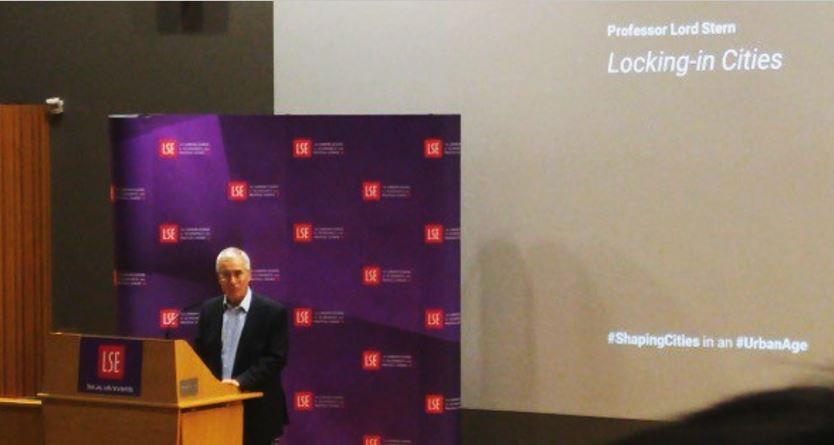Communicating Climate in Higher Education

Many of us who trained as marine scientists went into our field because we wanted not only to study the ocean, but to protect it — and to inspire others to do so as well. We reasoned that, if we just provided people with information, they would change their attitudes and take action. Unfortunately, this is not often the case. As we know from much of the social science research behind the Strategic Framing communications approach taught by the National Network for Ocean & Climate Change Interpretation, in reality, behavior change is much more complex.
That revelation is what brought me to the doorstep of the London School of Economics and Political Science where I am currently studying in the Department of Psychological and Behavioural Science (yes, they spell that with an “o”). I was originally drawn to the LSE because it houses the Grantham Research Institute on Climate Change and the Environment. This broadly interdisciplinary center got its start thanks to Professor Lord Nicholas Stern, who published the now infamous “Stern Review on the Economics of Climate Change” which caused a stir and brought the issue to the forefront of global policy debate back in 2006.

Though I have been a part of this program only for a few weeks so far, I’ve already been fortunate enough to see Lord Stern speak twice, most recently as part of a panel addressing “What Next for International Climate Action?” All panelists raised the key point that we need to get better at telling the story of climate change. Coming from a renowned institution of higher learning, this emphasis on effective communications as part of the climate change solution is a welcome breath of fresh air. Perhaps it’s an indication that we may see more universities taking an interdisciplinary approach to climate education which includes skills for climate storytelling.
As Lord Stern puts it, “This is the sustainable growth story of the 21st century.” He believes that reducing carbon dioxide emissions, improving living standards, and creating more resilient communities should not be seen as competing priorities but rather go hand-in-hand. “It’s not a horse race,” he insists. Professor Dame Judith Rees, Vice Chair of the Grantham Research Institute and former chair of the Royal Geographic Society, also recognizes the critical importance of finding ways to make science more accessible, understandable and actionable. “It is clear we need to do more work on how to communicate to the public and how to make behavior changes,” she says.
There may be increasing recognition that, as climate communicators, we are uniquely qualified, and uniquely powerful, in our capacity to influence behavior by conveying information in the form of compelling narratives of both urgency and hope. “We have to tell the positive stories of environmental sustainability, too,” insists UK Environment Agency Chair Emma Howard Boyd. With every encounter, we have a grand opportunity to move the needle on climate change, one story at a time. Let’s hope the bright young minds being educated today to help solve the problems of tomorrow will be well equipped with these skills.
More Blog Posts
 Lessons from COP23 – The Power Of CommunityLessons from COP23 – The Power Of Community Allison Arteaga, November 21 2017 Last week, the world’s leading voices on climate change gathered in Bonn, Germany for the 23rd Conference of the Parties (COP23) to the United Nations Framework Convention on Climate Change (UNFCCC). Since last year’s conference in Marrakech, the political [READ MORE]
Lessons from COP23 – The Power Of CommunityLessons from COP23 – The Power Of Community Allison Arteaga, November 21 2017 Last week, the world’s leading voices on climate change gathered in Bonn, Germany for the 23rd Conference of the Parties (COP23) to the United Nations Framework Convention on Climate Change (UNFCCC). Since last year’s conference in Marrakech, the political [READ MORE] Metaphors Can Counter Misinformation about Climate ChangeMetaphors Can Counter Misinformation about Climate Change December 02 2016 This is the fifth post in a series about framing ocean and climate change. Our ability to communicate the science of climate change to the public is as important as ever. The outcome of the recent presidential and congressional elections and the state of public discourse [READ MORE]
Metaphors Can Counter Misinformation about Climate ChangeMetaphors Can Counter Misinformation about Climate Change December 02 2016 This is the fifth post in a series about framing ocean and climate change. Our ability to communicate the science of climate change to the public is as important as ever. The outcome of the recent presidential and congressional elections and the state of public discourse [READ MORE] California Marine Life Feeling the Heat of Climate ChangeCalifornia Marine Life Feeling the Heat of Climate Change By Lisa Marie Potter, February 18 2016 Monterey Bay is home to an astonishing array of marine life, from kelp forests to sea otters to migrating whales. The secret to its productivity: the California Current. Monterey Bay’s rich ecosystem naturally varies in response to physical changes in [READ MORE]
California Marine Life Feeling the Heat of Climate ChangeCalifornia Marine Life Feeling the Heat of Climate Change By Lisa Marie Potter, February 18 2016 Monterey Bay is home to an astonishing array of marine life, from kelp forests to sea otters to migrating whales. The secret to its productivity: the California Current. Monterey Bay’s rich ecosystem naturally varies in response to physical changes in [READ MORE] Museums Mobilizing Climate ActionMuseums Mobilizing Climate Action Billy Spitzer, August 06 2018 (Excerpted from a commencement speech for the Harvard Extention School Museum Studies Program) The Role of Museums In Tackling Climate Change At the New England Aquarium, I spend most of my time working at the intersection of museums and sustainability. About 10 years ago, we realized [READ MORE]
Museums Mobilizing Climate ActionMuseums Mobilizing Climate Action Billy Spitzer, August 06 2018 (Excerpted from a commencement speech for the Harvard Extention School Museum Studies Program) The Role of Museums In Tackling Climate Change At the New England Aquarium, I spend most of my time working at the intersection of museums and sustainability. About 10 years ago, we realized [READ MORE] Angling Toward Solutions in Climate Change EducationAngling Toward Solutions in Climate Change Education John Anderson, September 21 2016 Our global community is confronting a significant opportunity to change. We understand that protecting what matters to our families: our health and security, special places we care about, and living creatures with whom we share this planet (people and non-human [READ MORE]
Angling Toward Solutions in Climate Change EducationAngling Toward Solutions in Climate Change Education John Anderson, September 21 2016 Our global community is confronting a significant opportunity to change. We understand that protecting what matters to our families: our health and security, special places we care about, and living creatures with whom we share this planet (people and non-human [READ MORE]